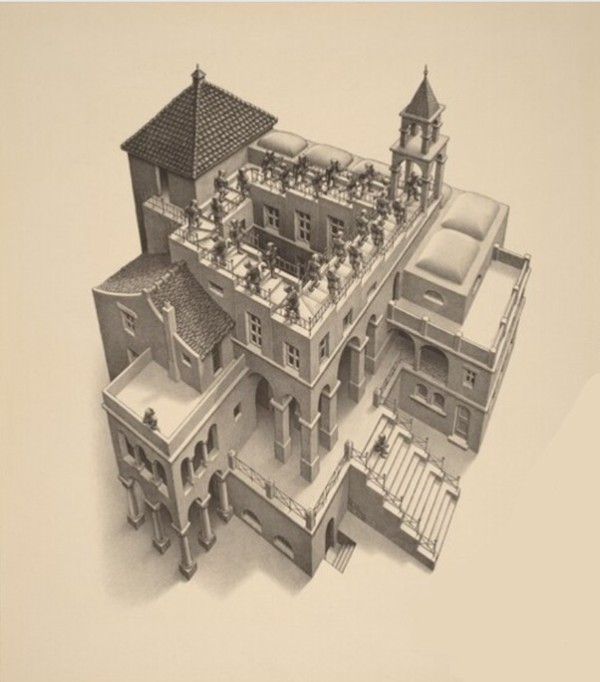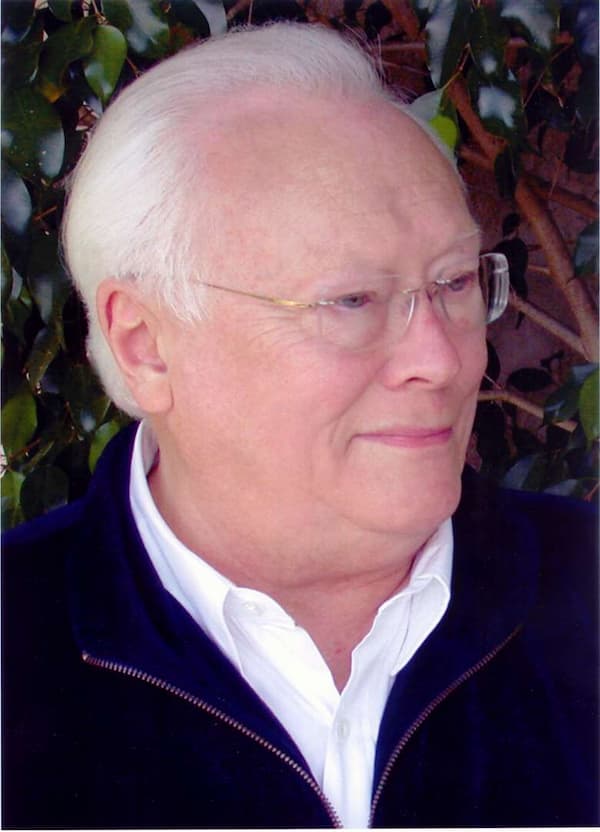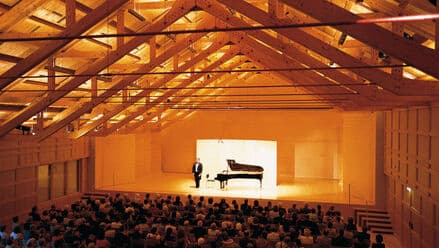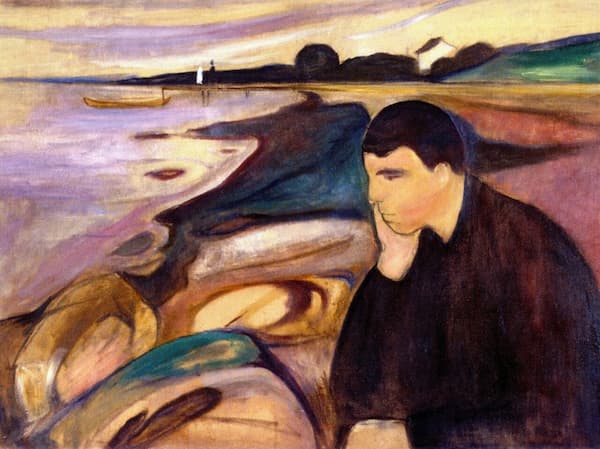In 1982, master storyteller Roald Dahl published a collection of poems under the title Revolting Rhymes. This parody of six favourite fairy tales features his darkly comic twists complete with rollicking rhymes and hilarious surprise endings. Humorously deviating from the traditional version, Dahl deliciously retells the stories of “Cinderella,” “Jack and the Beanstalk,” “Snow White and the Seven Dwarfs,” “Goldilocks and the Three Bears,” “Little Red Riding Hood,” and “The Three Little Pigs.” Brilliantly illustrated by Quentin Blake, the revolting and deliriously funny rhymes have also provided inspiration for a number of musical settings.
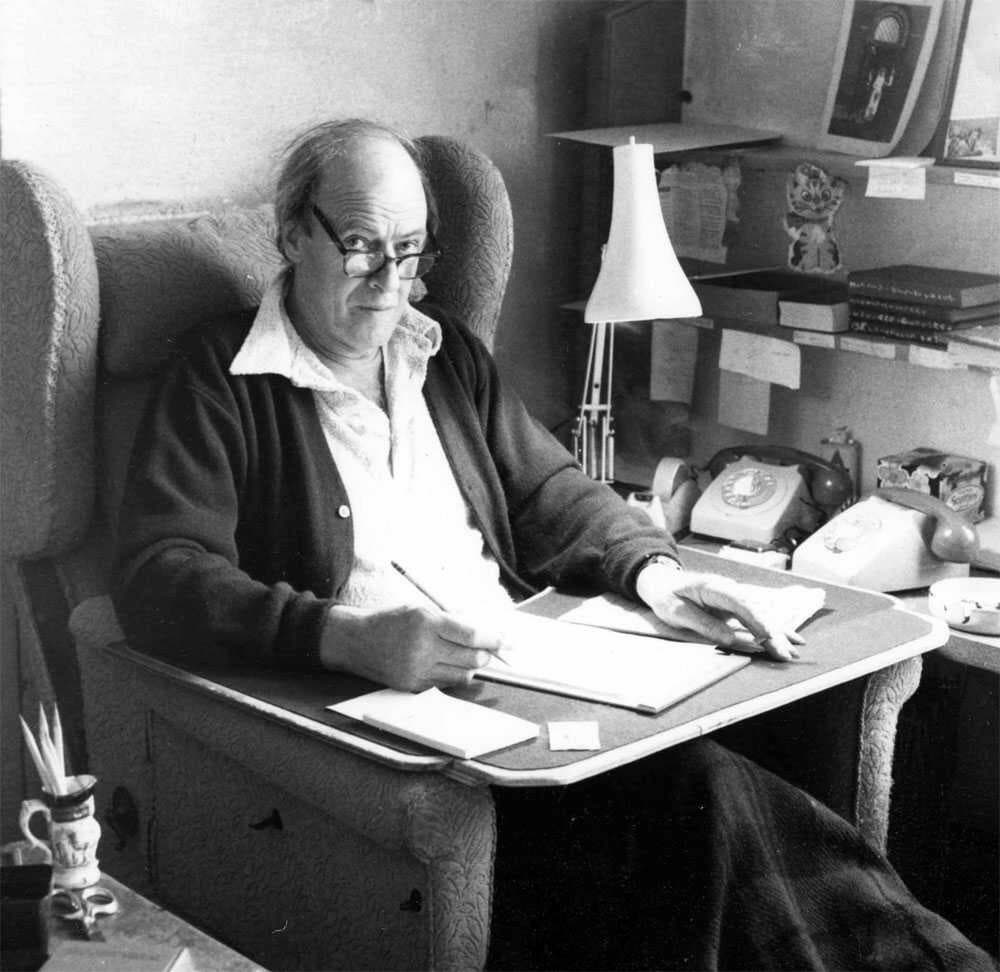
Roald Dahl in his writing hut
Paul Patterson: Little Red Riding Hood, Op. 73f “The Forest” (Rebecca Kenny, narrator; Magnard Ensemble)
Paul Patterson: Little Red Riding Hood, Op. 73f “Stupid Wolf” (Rebecca Kenny, narrator; Magnard Ensemble)
“Little Red Riding Hood”
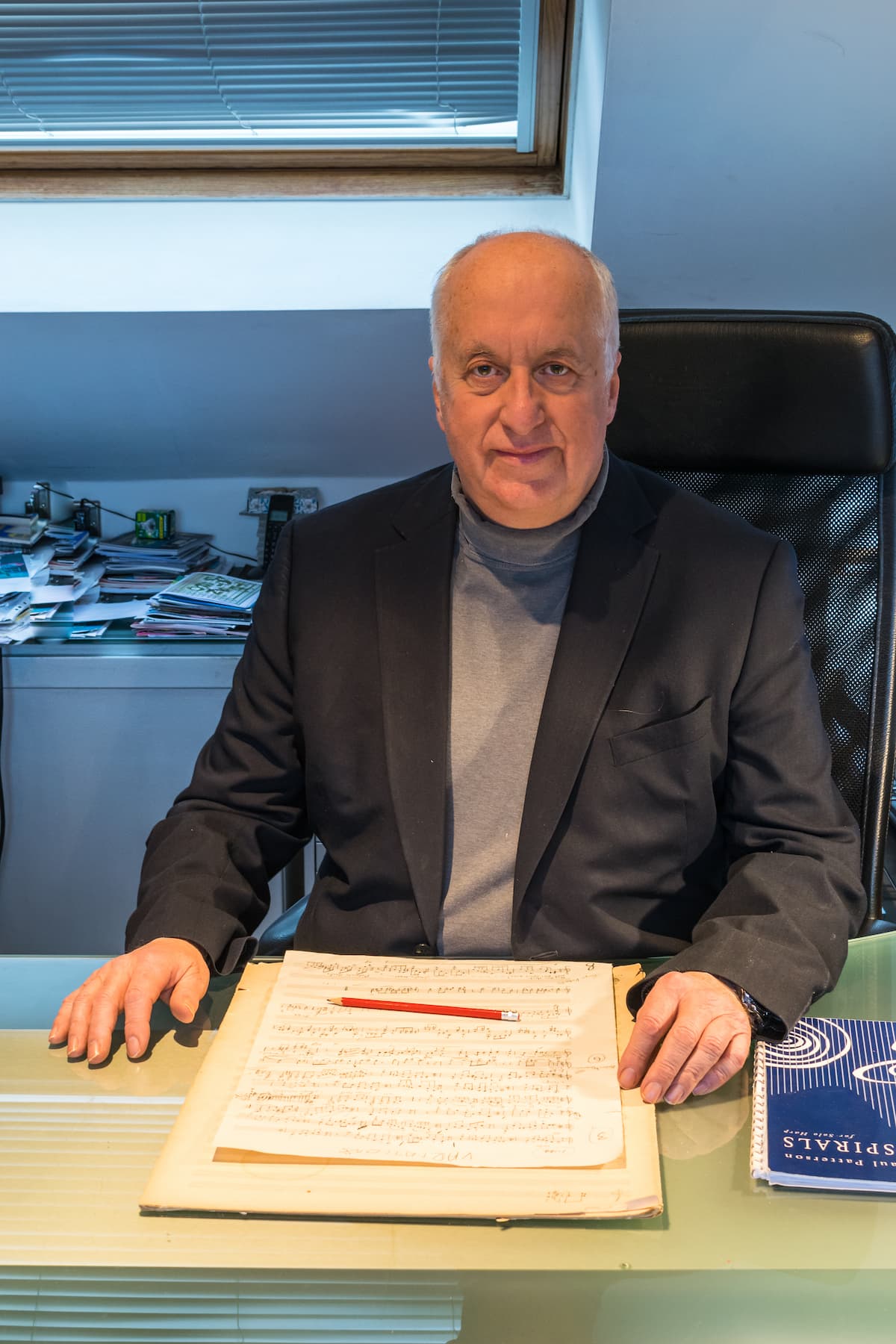
Paul Patteron
“Little Red Riding Hood” was originally composed for a full symphony orchestra by Paul Patterson, and several chamber versions also exist today. It was commissioned by Roald Dahl’s widow, Liccy, to benefit Roald Dahl’s Marvellous Children’s Charity. The project quickly expanded to use Dahl’s poetry as part of the overall narrative, with additional texts written by Donald Sturrock. The work premiered with the London Philharmonic Orchestra in 1992 at the Royal Festival Hall, and it has been a favourite of young and young-of-heart audiences ever since.
Paul Patterson has been called “one of the most versatile, successful and internationally-respected British composers of his generation. His compositions have been performed by many of the major orchestras around the world. He composes in a variety of musical styles, frequently employing the instruments in a rather humorous way. As such, it is hardly surprising that he has specifically made a name for himself as a composer of children’s music. In fact, Patterson seemed uniquely suited to take on this twisted verse by Roald Dahl.
Paul Patterson: Little Red Riding Hood, Op. 73f “There are far worse thing in there” (Rebecca Kenny, narrator; Magnard Ensemble)
Paul Patterson: Little Red Riding Hood, Op. 73f “Little Red Riding Hood” (Rebecca Kenny, narrator; Magnard Ensemble)
Donald Sturrock

Donald Sturrock © David Mees
During his time working for the BBC, Donald Sturrock used to frequently visit Roald Dahl to make a documentary about him. As he recalled, “we talked about music – he didn’t go to concerts, but he loved listening.” Dahl explained to Sturrock that he had always wanted some of his rhymes to be set to music, by way of an alternative to Peter and the Wolf. Dahl had already written a dramatization of the Revolting Rhymes for an intended TV series titled “Spitting Image.”
Since Sturrock already had a strong working relationship with the London Philharmonic Orchestra, everything quickly came together for the commission of the first of the Rhymes, “Little Red Riding Hood.” It was left for Sturrock to find a composer for the project as “he wanted to choose a composer who would have the excitement and sense of humour to bring Dahl’s work to life.” In the end, Sturrock explains, “I chose Paul Patterson for “Little Red Riding Hood” as I knew he would write something witty.”
Paul Patterson: Little Red Riding Hood, Op. 73f “Wolf’s meal” (Rebecca Kenny, narrator; Magnard Ensemble)
Paul Patterson: Little Red Riding Hood, Op. 73f “Grandma’s Tipple” (Rebecca Kenny, narrator; Magnard Ensemble)
The Original Poem
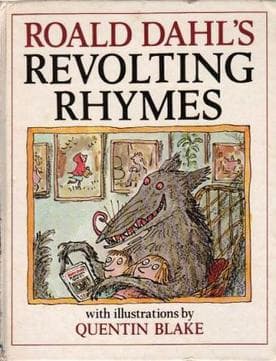
Roald Dahl’s Revolting Rhymes
As soon as Wolf began to feel
That he would like a decent meal,
He went and knocked on Grandma’s door.
When Grandma opened it, she saw
The sharp white teeth, the horrid grin,
And Wolfie said, “May I come in?”
Poor Grandmamma was terrified,
“He’s going to eat me up!” she cried.
And she was absolutely right.
He ate her up in one big bite.
But Grandmamma was small and tough,
And Wolfie wailed, “That’s not enough!
I haven’t yet begun to feel
That I have had a decent meal!”
He ran around the kitchen yelping,
“I’ve got to have a second helping!”
Then added with a frightful leer,
“I’m therefore going to wait right here
Till Little Miss Red Riding Hood
Comes home from walking in the wood.”
He quickly put on Grandma’s clothes,
(Of course he hadn’t eaten those).
He dressed himself in coat and hat.
He put on shoes, and after that
He even brushed and curled his hair,
Then sat himself in Grandma’s chair.
In came the little girl in red.
She stopped. She stared. And then she said,
“What great big ears you have, Grandma.”
“All the better to hear you with,” the Wolf replied.
“What great big eyes you have, Grandma.”
said Little Red Riding Hood.
“All the better to see you with,” the Wolf replied.
He sat there watching her and smiled.
He thought, I’m going to eat this child.
Compared with her old Grandmamma
She’s going to taste like caviar.
Then Little Red Riding Hood said, “But Grandma,
what a lovely great big furry coat you have on.”
“That’s wrong!” cried Wolf. “Have you forgot
To tell me what BIG TEETH I’ve got?
Ah well, no matter what you say,
I’m going to eat you anyway.”
The small girl smiles. One eyelid flickers.
She whips a pistol from her knickers.
She aims it at the creature’s head
And bang bang bang, she shoots him dead.
A few weeks later, in the wood,
I came across Miss Riding Hood.
But what a change! No cloak of red,
No silly hood upon her head.
She said, “Hello, and do please note
My lovely furry wolfskin coat.”
Paul Patterson: Little Red Riding Hood, Op. 73f “How was he going to get in?” (Rebecca Kenny, narrator; Magnard Ensemble)
Paul Patterson: Little Red Riding Hood, Op. 73f “Wolf carries out his plan” (Rebecca Kenny, narrator; Magnard Ensemble)
Perraut and Dahl
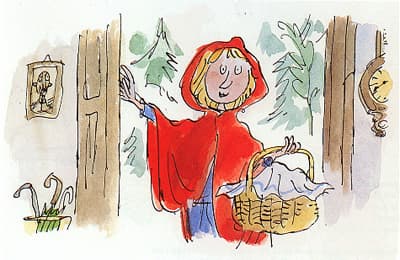
Quentin Blake’s Little Red Riding Hood
The fairy tale about a young girl and a sly wolf can be traced to the 17th century, but the two most popular versions, the ones you undoubtedly know, were written by Charles Perrault and the Brothers Grimm. Dahl follows the same story, sharing basic details, but the plots are different with opposite endings. Both versions share the same setting, but the characters of Red Riding Hood and the wolf as the main protagonist and antagonist are the only unchanging components.
In Perrault, the wolf is the stereotypical villain and the RRH is basically a spoiled, naïve, and defenceless little girl. Dahl turns it into the polar opposite, where the girl has all the strength and power, and the wolf ends up dead. To literary scholars, “Dahl creates a parody that simultaneously reflects modern standards of society and feminism.” Both versions involve death, but in Dahl, it is not the tragic death of the protagonist and her grandmother but the wolf’s demise that is viewed as a happy ending.
Paul Patterson: Little Red Riding Hood, Op. 73f “The Chase” (Rebecca Kenny, narrator; Magnard Ensemble)
Paul Patterson: Little Red Riding Hood, Op. 73f “Second Helping” (Rebecca Kenny, narrator; Magnard Ensemble)
The Musical Setting
The newly crafted text provides a delightful atmospheric narration that begins in an enchanted forest, but as in the poem, nothing is quite what it seems. “The forest. Strange. Eerie. Mysterious. A place of magic and surprise.” All the expected characters are present; there is a wolf, a grandma and a little girl in a red cape. However, Patterson related that the audience can now enjoy Dahl on a variety of levels, including music, spoken word, narrator’s interpretation, and in some versions, visual dance.
The narrator’s interpretation remains central in all the musical adaptations, “as the various composers have not been allowed to verbatim set the texts to music, leaving them instead to be freely spoken.” For Patterson, this was the most challenging part, “but it does lend itself to good, characterful narration.”
Paul Patterson: Little Red Riding Hood, Op. 73f “Miss Hood returns” (Rebecca Kenny, narrator; Magnard Ensemble)
Paul Patterson: Little Red Riding Hood, Op. 73f “The small girl smiles” (Rebecca Kenny, narrator; Magnard Ensemble)
Each of the three stars of the story has its own melody, which stylistically transforms when the character’s true identities are revealed. However, nothing is ever quite what it seems as the Grandma is initially portrayed with lovely sweet, and old music. “But when we discover that she is an alcoholic, her music becomes jazzy and the harmony changes. It goes from ballet to nightclub music,” and there are plenty of musical quotations to appeal to adults as well. Can you hear the delicious quotation from Wagner’s “Tristan and Isolde,” alongside various allusions to Beethoven symphonies?
For more of the best in classical music, sign up for our E-Newsletter
Paul Patterson: Little Red Riding Hood, Op. 73f “Miss Hood’s New Coat” (Rebecca Kenny, narrator; Magnard Ensemble)

